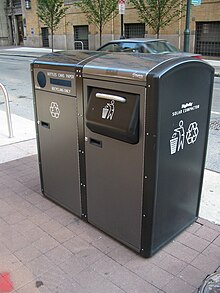BigBelly
This article includes a list of general references, but it lacks sufficient corresponding inline citations. (July 2012) |

BigBelly is a solar powered, rubbish-compacting bin, manufactured by U.S. company BigBelly Solar for use in public spaces such as parks, beaches, amusement parks, and universities. The bin was designed and originally manufactured in Needham, Massachusetts by Seahorse Power, a company set up in 2003 with the aim of reducing fossil fuel consumption. The first machine was installed in Vail, Colorado in 2004. Other locations to since use the bin include Cincinnati, Ohio, Boston, Massachusetts; Provincetown, Massachusetts; Chicago, Illinois; Dallas, Texas; Baltimore, Maryland; Philadelphia, Pennsylvania; Ventura, California; Oakland, California; San Diego, California; NYC, New York; Aberystwyth; as well as Aberdeen, Scotland; London, England; Hamburg, Germany; and Uppsala, Sweden[1] Due to the bin's commercial success, Seahorse Power changed its name to BigBelly Solar.
Operation
The bin has a capacity of 567 litres. Its compaction mechanism exerts 5.3kN of force, increasing the bin's effective capacity by five. The compaction mechanism is chain-driven, using no hydraulic fluids. Maintenance consists of lubricating the front door lock annually. The mechanism runs on a standard 12 volt battery, which is kept charged by the solar panel. The battery reserve lasts for approximately three weeks. Wireless technology-enabled units report their status into the CLEAN (Collection, Logistics, Efficiency and Notification system) dashboard that gives waste management and administration insights for monitoring and route optimization. BigBelly Solar also provides companion recycling units that allow cities, parks and universities to collect single-stream or separated recyclable materials in public spaces.
References
- ^ Smart papperskorg till Uppsala. Vattenfall. May 29, 2015.
- "News: Technology Briefs". Eureka Magazine. Vol. 28, no. 4. April 2008. p. 8.
{{cite magazine}}: Cite has empty unknown parameter:|coauthors=(help) - Solar Compactors Make Mincemeat of Trash, All Things Considered, NPR, July 17, 2007
- Thinking Outside the Bin, All Things Considered, WasteAdvantage Magazine, March 1, 2011
External links
- BigBellySolar.com - Manufacturer's website
- BigBellySolar.co.uk - Manufacturer's website
